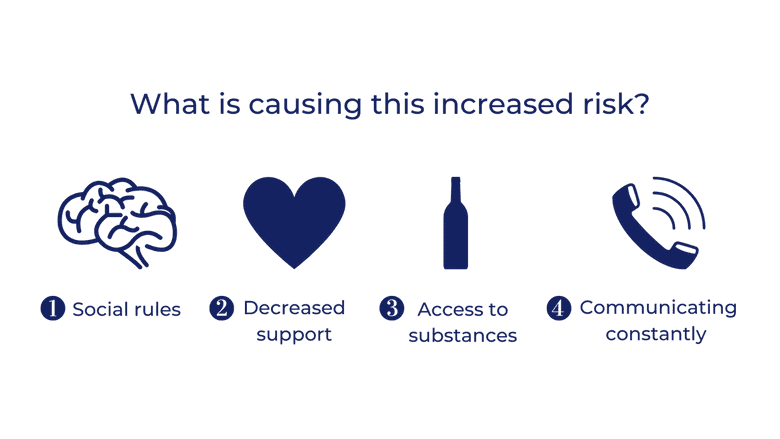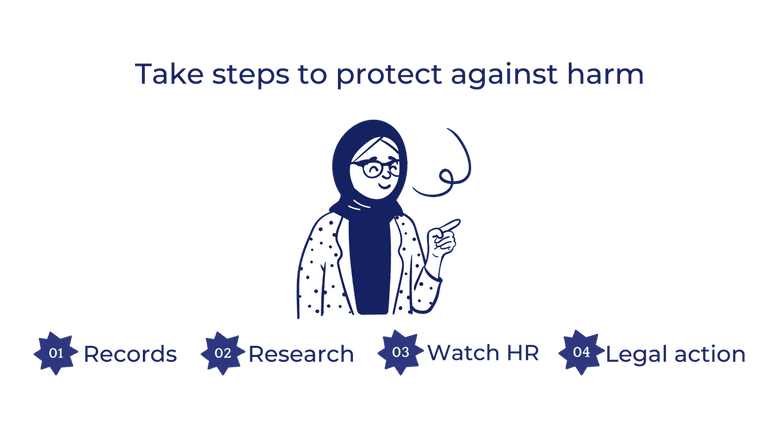Yes, sexual harassment can still happen in remote work
The workplace is changing, but some of the old problems are still there.
While sexual harassment typically brings to mind inappropriate physical touch or verbal remarks in the office, it can also occur outside of in-person interactions. With much of the world working remotely, we offer some insights into understanding sexual harassment in this new work environment, as well as what you can do if you are experiencing it.
What is sexual harassment?
Before we dive in, what is the definition of sexual harassment? According to federal laws, sexual harassment is defined as unwelcome sexual advances, requests for sexual favors, and other verbal or physical conduct of a sexual nature that explicitly or implicitly affects an individual's work performance, or creates an intimidating, hostile, or offensive work environment.
How do sexual harassment laws work?

Employees are protected from such conduct under Title VII of the Civil Rights Act of 1964. This federal law prohibits sex discrimination, including (of course) sexual assault and inappropriate sexual conduct in the workplace.
As it stands today, there are two types of sexual harassment claims that can be filed:
- Quid pro quo: Filed against those in positions of power. These harassers use their seniority to coerce employees into compliance (i.e. making employment decisions, like promotions or lay offs, based on sexual favors)
- Hostile work environment: Filed against anyone associated with the organization, even nonemployees. These harassers impact the comfort or performance of the filer.
In the United states, state laws on sexual harassment vary. Depending on the location of the company and of the employee, different laws may apply.
How it works in New York
New York recently strengthened protections against sexual harassment (and other forms of discrimination and harassment) under the New York State Human Rights Law. Among other things, this law ensures that harassment does not need to be severe or pervasive to be against the law, that employers must have a sexual harassment prevention policy and training, and that the statute of limitations for filing a sexual harassment complaint with the Division of Human Rights is extended from one to three years.
How it works in California
In California, sexual harassment is prohibited by both Title VII and The Fair Employment and Housing Act (FEHA). Under California law, the misconduct does not need to be motivated by sexual desire to qualify as sexual harassment - it could be based on an employee’s actual or perceived sex or gender-identity, actual or perceived sexual orientation, pregnancy, childbirth, or related medical conditions. Under this law, actions that create a hostile environment for a co-worker could be sexual harassment. It also entails that a person could experience sexual harassment from another individual of the same sex.
Sexual harassment in remote work

Sexual harassment, as defined by discrimination laws, can certainly happen in remote work - as those who worked remotely before COVID-19 are well aware. The laws apply regardless of when or where it occurs. In other words, an action that would be considered sexual harassment if done in-person is still sexual harassment if done online or over the phone. For example, a manager who messages racy photos of an employee that he found on Instagram to his colleagues after work could be committing sexual harassment.
Why risk is higher in remote environments
The risk of sexual harassment could be higher in remote settings. As reported by the U.S. Equal Employment Opportunity Commission (EEOC), decentralized workplaces and remote workplaces are two of the organizational risk factors for sexual harassment. The risks are heightened for multiple reasons:
Opaque definitions. Employees may believe that company policies and rules about conduct don’t apply outside of the physical working environment
Decreased support. Remote employees often have less access to HR and support when workplace harassment occurs.
Contributors to poor judgment. While working at home, employees may have more access to alcohol or substances that could contribute to poor judgment and sexual misconduct. For example, for companies with employees that work in different time zones, an employee may be intoxicated during the nighttime and send inappropriate Slack messages to another employee that is online during her work hours.
Access to constant virtual communication. Inappropriate modes of virtual communication also present a significant risk for remote workers. For instance, an employee could call a colleague multiple times every day under the pretense of work, despite the communication not being welcomed, instead of simply sending an email.
What to do if you’re facing sexual harassment while working remotely

If you’re facing sexual harassment, know that you are protected by the law and that there are several key actions you should take.
1. Keep records
First, it is crucial that you keep all records of the incidents whenever possible, such as taking screenshots of the relevant Slack messages, call records, or texts. This is important because you could lose access to your computer or online accounts, thus, you should make printed copies of those online records in addition to storing them safely and privately digitally.
2. Do your research
Second, you should find out the specific laws that apply to the state where you work and where your company is located, as discussed above. You should also review your company’s employee handbook to see its policy on sexual harassment and the steps the company states it will take in the event it occurs.
3. Be careful with HR
It is essential that you know your rights under the laws and according to your company’s employee handbook before going to HR. As expressed by many who have experienced sexual harassment, HR exists to protect the company first. If you know that your company’s HR department has not preserved anonymity for past complaints and that complaining may lead to retaliation, be cautious about taking this step.
4. Take legal action, if needed
If your company’s HR is unable or unwilling to address the issue effectively, you can seek legal advice. Note that you don’t need a lawyer to report sexual harassment to your employer or file a complaint with the EEOC, but you may benefit from one given the confusion and difficulty of such situations.
If the costs of legal advice are a barrier, you also have options for free legal assistance. Some law firms offer free consultations. To find lawyers that represent plaintiffs and victims of sexual harassment near you, you can search the directories of the American Bar Association, the National Employment Lawyers Association, or the nonprofit Workplace Fairness. In addition, you can contact advocacy organizations like Equal Rights Advocates or the National Women’s Law Center Fund that offer free legal advice, counseling, or referrals.
You are not alone
Sexual harassment is neither impossible nor uncommon in remote work. If you are facing workplace sexual harassment, know that you are not alone and that you have options. It is crucial that you know your rights under the applicable laws, keep all records of the incidents, and seek support from your company’s HR or a plaintiff’s lawyer.
The information provided herein is for general informational purposes only and is not intended to provide tax, legal, or investment advice and should not be construed as an offer to sell, a solicitation of an offer to buy, or a recommendation of any security by Candor, its employees and affiliates, or any third-party. Any expressions of opinion or assumptions are for illustrative purposes only and are subject to change without notice. Past performance is not a guarantee of future results and the opinions presented herein should not be viewed as an indicator of future performance. Investing in securities involves risk. Loss of principal is possible.
Third-party data has been obtained from sources we believe to be reliable; however, its accuracy, completeness, or reliability cannot be guaranteed. Candor does not receive compensation to promote or discuss any particular Company; however, Candor, its employees and affiliates, and/or its clients may hold positions in securities of the Companies discussed.
